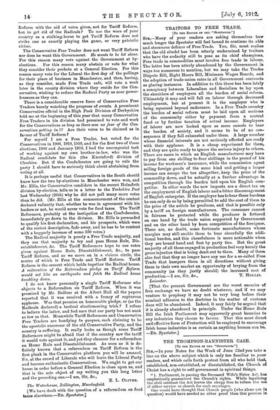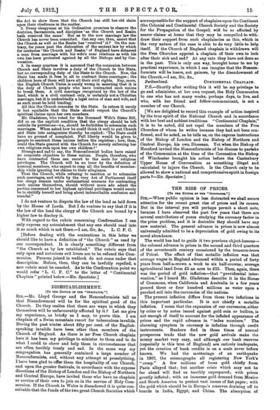THE THOMPSON-BANNISTER CASE.
[To THE EDITOR OF THE "SPECTATOR."] SIE,—In your Notes for the Week of June 22nd you take a line on the above subject which is only too familiar to your readers, and which calls forth protest from all who hold that., established, non-established, or disestablished, the Church of Christ has a right to self-government in spiritual things.
"1. Parliament, in passing the Deceased Wife's Sister Act, has emphatically guaranteed the Church's rights. While legalizing the civil contract the Act leaves the clergy free to refuse the use of either service or church for such marriages. One would have thought that Church people (who alone are in question) would have needed no other proof than this proviso in
the Act to show them that the Church has still her old claim upon their obedience in the matter. 2. Every clergyman at his Ordination promises to observe the doctrine, Sacraments, and discipline as this Church and Realm bath reoeived the same.' But as to the new marriage law the Church has never been consulted. Can any one, then, assert that the Church as well as the Realm has received' it ? On the con- trary, for years past the dislocation of the ancient law by which for centuries the Church and Realm' of England have debarred a man from marriage with his wife's near relations as with his own has been protested against by all the Bishops and by Con- vocation.
3. In many quarters it is assumed that the connexion between Church and State involves a duty of the Church to the State, but no corresponding duty of the State to the Church. Now, the State has made- it free to all to contract these marriages ; the children born of them will have all their civil rights. Nay, more, the English Church Union is surely wrong in asserting that it is the duty of Church people who have contracted such unions to break them. A civil marriage recognized by the law of the land, which is a civil contract only, is certainly not a Christian marriage, but it is undoubtedly a legal union of man and wife, and as such must be held binding.
All this the Church concedes to the State. In return it surely is but equitable that the State should respect the Church's spiritual claims upon her own members. Mr. Gladstone, who voted for the Deceased Wife's Sister Bill, did so on the explicit condition that the clergy should be left outside its provisions—i.e., should be forbidden to solemnize such marriages. When asked how he could think it well to put Church and State into antagonism thereby he replied: 'The State could have no ground of complaint. Full liberty would be given to people to contract these unions before the registrar; how, then, could the. State quarrel with the Church for merely enforcing her own religious rule upon her own children ? ' Strange and sad to say, the Nonconformist bodies have raised no corporate objection to these unions. People, therefore, who have contracted them can resort to the sects for religious privileges. The Church will be no loser by the defection of nominal members, who expect to reap all the benefits of member- ship while ignoring her claims to their allegiance.
That the Church, while refusing to sanction or to solemnize such marriages, and while by the very Act of Parliament itself her clergy remain under ecclesiastical censures for contracting such unions themselves, should without more ado admit the parties concerned to her highest spiritual privileges would surely be to stultify herself and bring about indescribable confusion and scandal."
I do not venture to dispute the law of the land as laid down by the House of Lords. But I do venture to say that if it is the law of the land the clergy of the Church are bound by a higher law to disobey it.
With regard to the rubric concerning Confirmation I can only express my astonishment that any one should read into it so much which is not there.—I am, Sir, &c., L. C. F. C.
[Before dealing with the contentions in this letter we should like to have a definition of "the Church " as used by our correspondent. It is clearly something different from "the Church as by law established." The rubric says that only open and notorious evil livers are to be refused the Com- munion. Persons joined in wedlock do not come under that description. Before, then, they can be lawfully repelled, a new rubric must be enacted. As to the Confirmation point we would refer " L. C. F. C." to the letter of " Continental Chaplain" printed below.—En. Spectator.]



















































 Previous page
Previous page